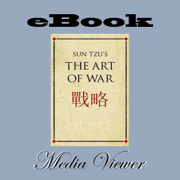eBook: The Art of War
开发者: Procypher Software Co.
659天13小时
最新版本上线距今
0
近1年版本更新次数
2009-12-20
全球最早版本上线日期
版本: 7.3
版本更新日期
2023-01-29

eBook: The Art of War
更新日志
• Updated for latest iOS version
• Miscellaneous improvements应用描述
Enjoy reading The Art of War ebook with auto-scrolling, day and night viewing modes, bookmarks, multiple font sizes, full screen viewing in portrait and landscape orientations, and more!
FEATURES:
• AUTO-SCROLL: Hands free reading with our advanced variable speed auto-scrolling.
• FULL SCREEN VIEW: No tab, navigation, or toolbars to get in your viewing way.
• BOOKMARK CONTROLS: Bookmarking lets you start up where you left off fast.
• MULTIPLE FONT SIZES: Increase or decrease the text size quickly and easily.
• DAY & NIGHT MODES: Switch from day to night mode at the touch of a finger.
• PORTRAIT & LANDSCAPE: Read your eBook in portrait or landscape position.
• AUTO SETTINGS: Your viewer settings are automatically saved and loaded.
• COPY & PASTE: Copy and paste selected text to other apps.
• TEXT MAGNIFICATION: Magnify text for easier reading.
• And more!
eBook Media Viewer Series #21
Title: The Art of War
Author: Sun Tzu
Pages: 164
Details:
The Art of War is one of the oldest, most successful, and definitive books on military strategy and tactics. It has had an influence on Eastern military thinking, business tactics, and beyond. Sun Tzu suggested the importance of positioning in strategy and that position is affected both by objective conditions in the physical environment and the subjective opinions of competitive actors in that environment. He thought that strategy was not planning in the sense of working through an established list, but rather that it requires quick and appropriate responses to changing conditions - planning works in a controlled environment, but in a changing environment.
Table of Contents:
1.Laying Plans- explores the five fundamental factors that define a successful outcome. By thinking, assessing and comparing these points you can calculate a victory, deviation from them will ensure failure. Remember that war is a very grave matter of state.
2.Waging War- explains how to understand the economy of war and how success requires making the winning play, which in turn, requires limiting the cost of competition and conflict.
3.Attack by Stratagem- defines the source of strength as unity, not size, and the five ingredients that you need to succeed in any war.
4.Tactical Dispositions- explains the importance of defending existing positions until you can advance them and how you must recognize opportunities, not try to create them.
5.Energy- explains the use of creativity and timing in building your momentum.
6.Weak Points & Strong- explains how your opportunities come from the openings in the environment caused by the relative weakness of your enemy in a given area.
7.Maneuvering- explains the dangers of direct conflict and how to win those confrontations when they are forced upon you.
8.Variation in Tactics- focuses on the need for flexibility in your responses. It explains how to respond to shifting circumstances successfully.
9.The Army on the March- describes the different situations in which you find yourselves as you move into new enemy territories and how to respond to them. Much of it focuses on evaluating the intentions of others.
10.Terrain- looks at the three general areas of resistance (distance, dangers, and barriers) and the six types of ground positions that arise from them. Each of these six field positions offer certain advantages and disadvantages.
11.The Nine Situations- describe nine common situations (or stages) in a campaign, from scattering to deadly, and the specific focus you need to successfully navigate each of them.
12.The Attack by Fire- explains the use of weapons generally and the use of the environment as a weapon specifically. It examines the five targets for attack, the five types of environmental attack, and the appropriate responses to such attack.
13.The Use of Spies- focuses on the importance of developing good information sources, specifically the five types of sources and how to manage them.版本: 7.2
版本更新日期
2018-03-05

eBook: The Art of War
更新日志
This app has been updated by Apple to display the Apple Watch app icon.
• Updated for latest iOS version
• Miscellaneous improvements应用描述
暂无应用描述数据
版本: 7.0
版本更新日期
2016-01-27

eBook: The Art of War
更新日志
Updated for latest IOS.应用描述
暂无应用描述数据
版本: 6.1
版本更新日期
2015-12-14

eBook: The Art of War
更新日志
Updated for iOS 9.2应用描述
暂无应用描述数据
版本: 6.0
版本更新日期
2015-12-05

eBook: The Art of War
更新日志
Updated for iOS 9.1应用描述
暂无应用描述数据
版本: 5.0
版本更新日期
2014-01-11

eBook: The Art of War
更新日志
Optimized for iOS 7.应用描述
暂无应用描述数据
版本: 4.0
版本更新日期
2012-09-30

eBook: The Art of War
更新日志
Added iPad support.应用描述
暂无应用描述数据
版本: 3.6
版本更新日期
2010-08-04

eBook: The Art of War
更新日志
New features: Fixed minor bugs.应用描述
暂无应用描述数据
版本: 3.5
版本更新日期
2010-07-29

eBook: The Art of War
更新日志
New features: Improved processing performance. Added iOS 4 compatibility.应用描述
暂无应用描述数据
版本: 3.3
版本更新日期
2010-02-08

eBook: The Art of War
更新日志
New features: Improved auto-scrolling.应用描述
暂无应用描述数据










 京公网安备 11010502041000号
京公网安备 11010502041000号





